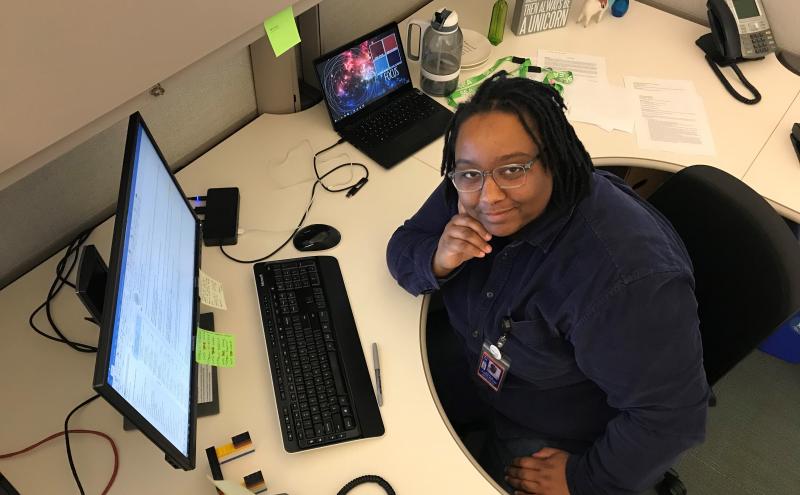
Beginning on Martin Luther King Jr. Day and all through Black History Month, the Port of Seattle’s Office of Equity, Diversity, and Inclusion (OEDI) is honoring members of our diverse community. We are highlighting members of the Port team who are inspired by Dr. King’s legacy and are working to transform the Port into a socially just organization.
Kayla Huddleston joined the Port of Seattle in October 2019 to support the Office of Equity, Diversity, and Inclusion (OEDI) and the Workforce Development program. Prior to her work at the Port, she managed recruitment and admissions for the Master of Social Work program at Seattle University. Her educational background in social work with a focus on policy and passion for social justice and racial equity were the perfect addition to the team.
Recently, Bookda Gheisar, Senior Director of OEDI, spoke to our team about the need to create an environment of collaboration, starting with our office. Her first action was to lower the division walls from our cubicles. This act of removing literal barriers between us struck me as the essence of our work. We aim to break down structures and barriers between people and within systems that are often invisible.
In reflecting on the work and legacy of Dr. Martin Luther King Jr., his statement that “injustice anywhere threatens justice everywhere” resonates with me. While Dr. King worked to break down barriers to racial equity, his legacy gives us the framework to recognize bias and address injustices to ensure everyone at the Port feels that they belong and are supported.
While I have a strong understanding of racial justice and have faced direct discrimination myself as a person of color, I am still learning about the idea of intersectionality and how our identities are not mutually exclusive but inform each other. While I am a Black woman, I am also able-bodied and young. Recognizing these as positions of power in our society, I can use my voice to identify and help remove barriers for others who may not be able to do it by themselves.
Further, as we start Black History Month, it is important to recognize that while events and celebrations help to build understanding of the issues we face as a united community, part of building a culture of belonging is recognizing differences within groups as well as the differences between them. As a Black person, I have a shared history with many other Black employees at the Port. However, I am also a queer woman which equally informs how I move through the world. A shared racial identity with other black people does not mean that we all share a set of experiences.
Black History Month is an opportunity to start conversations and make sure that people are talking and thinking about how differently others — even those within their own communities — may experience the work environment. And, as an institution, it’s an opportunity to commit to building a culture that welcomes these differences and creates equal and just opportunities for all.
I am very excited to be working at the OEDI because we are the people responsible for doing just that. We are shifting the paradigm by creating spaces for people to have meaningful conversations about equity and inclusion that inform, educate, and challenge assumptions. We are nurturing a culture that recognizes and respects differences and acknowledges the humanity we all deserve. We are liberating people from their own tired assumptions and helping them to see the world from different perspectives. It’s exciting and I hope it will propel our staff to get involved and exponentially grow our efforts through contributions in their departments and circles.
I find more inspiration every day to move our work forward. Just recently — at an event at the Port — I met a couple of Black colleagues in person for the first time. We had a fun, engaging conversation in which we laughed and shared stories using words and phrases I only use with other Black folks. Afterwards while sitting at my desk smiling, I recognized the glow of what I was feeling — connection. I was able to be myself at work and authentically connect with other people. This is the type of culture that Dr. King dreamed of and what the OEDI is building, a Port where all employees can bring their full selves to work and know that they belong.






